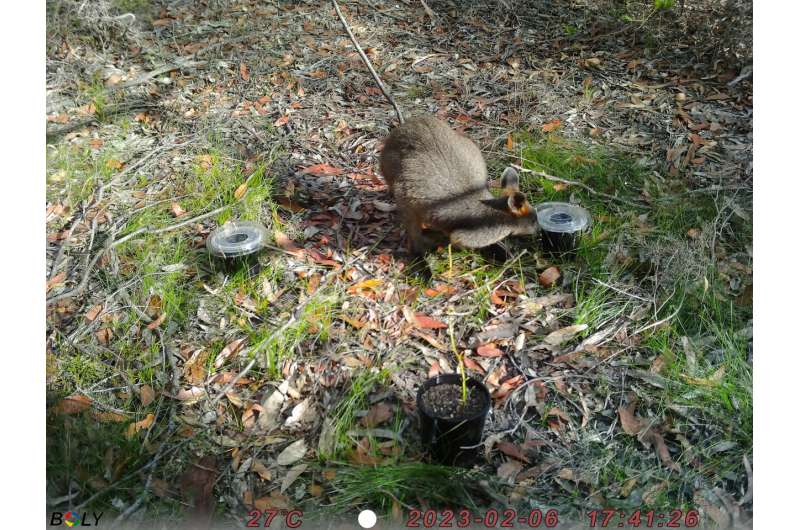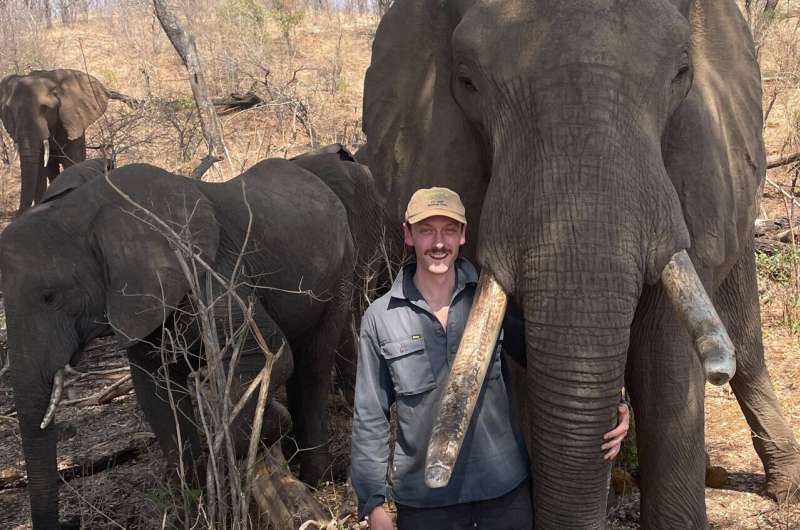This article has been reviewed according to Science X's editorial process and policies. Editors have highlighted the following attributes while ensuring the content's credibility:
fact-checked
peer-reviewed publication
trusted source
proofread
Fooled: Herbivorous animals 'led by the nose' to leave plants alone

University of Sydney researchers have shown it is possible to shield plants from the hungry maws of herbivorous mammals by fooling them with the smell of a variety they typically avoid.
Findings from the study published in Nature Ecology & Evolution show tree seedlings planted next to the decoy smell solution were 20 times less likely to be eaten by animals.
"This is equivalent to the seedlings being surrounded by actual plants that are unpalatable to the herbivore. In most cases it does trick the animals into leaving the plants alone," said Ph.D. student Patrick Finnerty, the study's lead author from the School of Life and Environmental Sciences Behavioural Ecology and Conservation Lab.
"Herbivores cause significant damage to valuable plants in ecological and economically sensitive areas worldwide, but killing the animals to protect the plants can be unethical," he said.
"So, we created artificial odors that mimicked the smell of plant species they naturally avoid, and this gently nudged problematic herbivores away from areas we didn't want them to be. Given that many herbivores use plant odor as their primary sense to forage, this method provides a new approach that could be used to help protect valued plants globally, either in conservation work or protecting agricultural crops."
The experiment, conducted in Ku-ring-gai Chase National Park in Sydney, used the swamp wallaby as model herbivore. The researchers selected an unpalatable shrub in the citrus family, Boronia pinnata, and a palatable canopy species, Eucalyptus punctata, to test the concept.
The study compared using B. pinnata solution and the real plant and found both were equally successful at protecting eucalypt seedlings from being eaten by wallabies.
As part of his doctoral research, Mr. Finnerty has also tested the method successfully with African elephants, but that fieldwork does not form part of this research paper.
Previous attempts to use repellent substances—such as chili oil or motor oil—to control animal consumption of plants have inherent limitations, Mr. Finnerty said.

"Animals tend to habituate to these unnatural cues and so deterrent effects are only temporary," he said. "By contrast, by mimicking the smell of plants herbivores naturally encounter, and avoid in day-to-day foraging, our approach works with the natural motivators of these animals, with herbivores less likely to habituate to these smells."
Researchers took this idea and used solutions that produce these undesired aromas.
"As a management tool to protect palatable plants, our technique offers many advantages over real plants as a repellent," Mr. Finnerty said. "Real plants compete for water and resources, which can outweigh protective effects in providing browsing refuge.
"Our approach should be transferable to any mammalian—or potentially invertebrate—herbivore that relies primarily on plant odor information to forage and could protect valued plants globally, such as threatened species."
Current solutions to herbivore-related problems often involve costly and environmentally impactful measures such as lethal control or fencing.
The new research introduces an alternative low-cost, humane strategy based on understanding herbivores' foraging cues, motivations and decisions.
"Plant browsing damage caused by mammalian herbivore populations like deer, elephants and wallabies is a growing global concern," said senior study author Professor Clare McArthur.
"This damage is one of the greatest limiting factors in areas of post-fire recovery and revegetation, destroying more than half the seedlings in these areas. It also threatens endangered plants and causes billions of dollars of damage in forestry and agriculture globally. Current methods to protect plants are expensive and increasingly limited by concerns over animal welfare, so alternate approaches are needed."
More information: Olfactory misinformation provides refuge to palatable plants from mammalian browsing, Nature Ecology & Evolution (2024). DOI: 10.1038/s41559-024-02330-x
Journal information: Nature Ecology & Evolution
Provided by University of Sydney





















